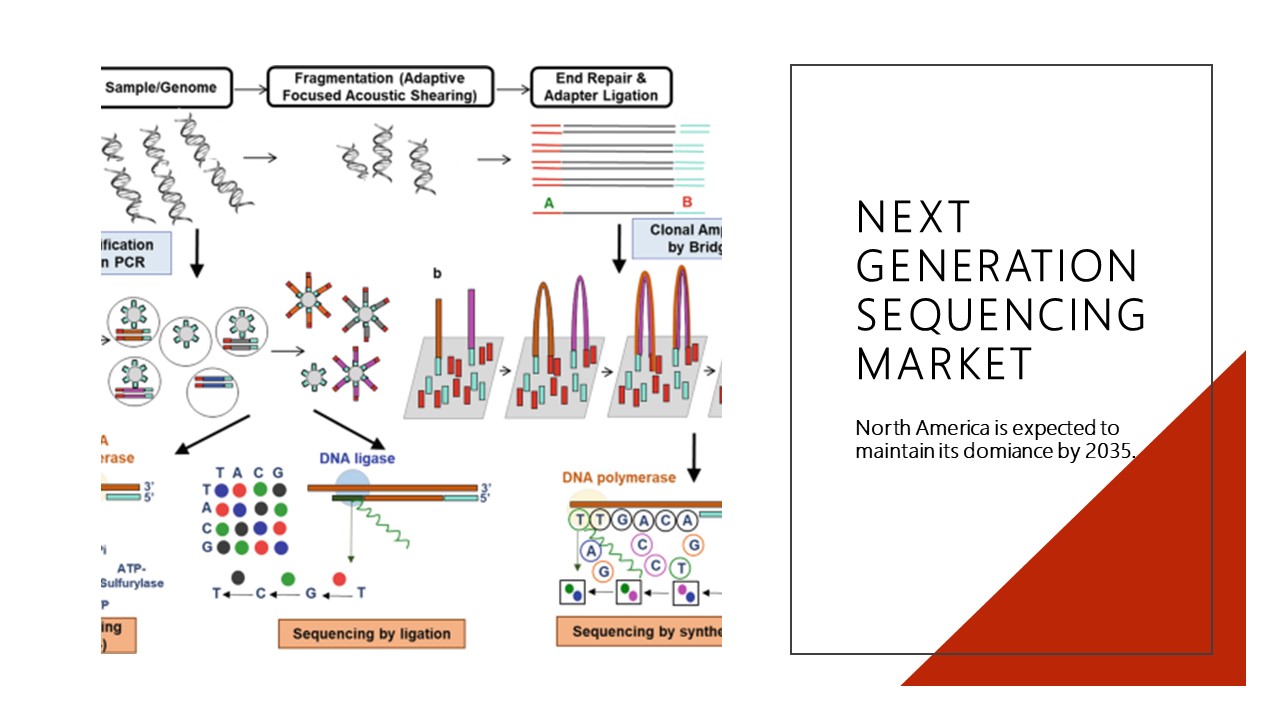Next Generation Sequencing Market Research, 2035 - PowerPoint PPT Presentation
Title:
Next Generation Sequencing Market Research, 2035
Description:
The global next generation sequencing market was valued at $13 billion in 2023, and is projected to reach $97.8 billion by 2035, growing at a CAGR of 18.3% from 2024 to 2035. – PowerPoint PPT presentation
Number of Views:0
Title: Next Generation Sequencing Market Research, 2035
1
Next Generation Sequencing Market
North America is expected to maintain its
domiance by 2035.
2
Prime determinants of growth
Growth in adoption of next generation sequencing,
advancements in technologies and presence of key
players are the factors that drive the growth of
the global next generation sequencing market.
However, complexity in data analysis and
interpretation, requiring skilled bioinformatics
expertise is anticipated to hinder market growth.
On the contrary, a rise in healthcare expansion
is expected to offer remunerative opportunities
for the next generation sequencing market during
the forecast period. According to the report,
the global next generation sequencing market was
valued at 13 billion in 2023 and is estimated to
reach 97.8 billion by 2035, exhibiting a CAGR of
18.3 from 2024 to 2035.
3
- Key Features of NGS
- Parallelism NGS sequences millions of fragments
simultaneously. - High Throughput Capable of sequencing entire
genomes quickly. - Cost-Effective Lower cost per base compared to
Sanger sequencing. - Versatile Can sequence DNA, RNA, and epigenetic
modifications.
4
How Does NGS Work?
- Library Preparation DNA or RNA is fragmented and
tagged with adapters to create a library of
fragments. - Amplification The library is amplified to
increase the amount of DNA for sequencing. - Sequencing The amplified library is sequenced
using platforms like Illumina, Oxford Nanopore,
or PacBio. These platforms differ in their
sequencing techniques but all provide
high-throughput data. - Data Analysis Bioinformatics tools are used to
assemble the sequence reads, align them to a
reference genome, and identify genetic variations.
5
(No Transcript)
6
Leading Market Players
- Illumina Inc.
- F. Hoffmann-La Roche AG
- Qiagen N.V
- ABGI group
- PerkinElmer, Inc
- Agilent Technologies, Inc.
- Pacific Biosciences of California
- Thermo Fisher Scientific Inc.
- Precigen Inc
7
The sequencing by synthesis segment to maintain
its lead position during the forecast period.
By technology, the sequencing by
synthesis segment accounted for the largest share
in 2023, accounting for two-thirds of the global
next generation sequencing market revenue. This
is attributed to its efficiency in generating
high-quality sequencing data at scale, meeting
the increasing demand for rapid and economic
genomic analysis in diverse applications. Connec
t to our Analyst- https//www.alliedmarketresear
ch.com/connect-to-analyst/2048































